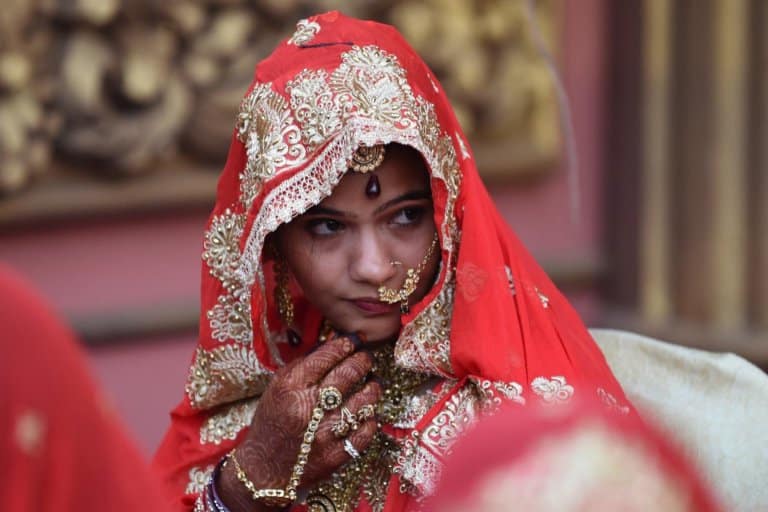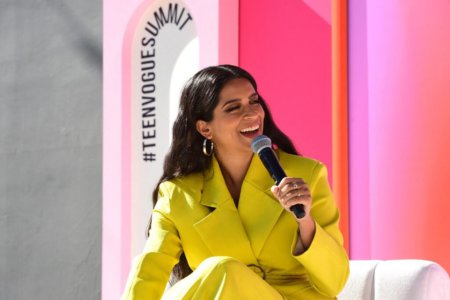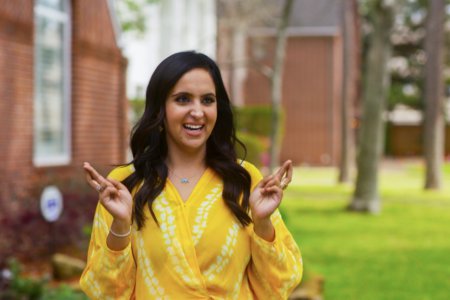
A new academic paper predicts that by 2050, it will be tough for Indian women to find an eligible partner than men. But what could be causing this dramatic change in Indian marriage?
Two factors are responsible for this change: the acceptable age gap between partners and the increasing percentage of educated women. So is university worth it?
That’s the conclusion gathered from research by Ridhi Kashyap from the University of Oxford, Albert Esteve from the Centre d’Estudis Demogràfics and Joan García-Román from the University of Minnesota.
While the age gap can be explained away with notions of maturity and finding someone on the same wavelength, it is interesting to see that a rise in educated women corresponds to a decline in marriage rates.

Might a foreign education be more important than an Indian marriage? Source: Narinder Nanu / AFP
Why is there a decline in Indian marriage rates?
The trend of declining Indian marriage rates began gradually, according to the study.
“In India, the proportion of women aged 20-39 with less than primary level education fell from 60% to 36% between 1990 and 2010, and the proportions with secondary education rose from 16% to 33%”, it states.
“By 2050, over one-fourth (26%) of all women aged 20 to 39 are projected to complete tertiary education compared to 23% of men in those ages.”
There is a sense, especially due to societal traditions and perceptions, that men prefer women who are less educated than them.
“Across both arranged and choice-based marriage systems, studies indicate educational homogamy (unions between men and women of similar educational attainment) is the rule, but where
heterogamy prevails, educational hypergamy (unions between a man and woman where the woman has lower educational attainment than the man) rather than educational hypogamy (woman has higher educational attainment than the man) is the characteristic pattern,” the research reveals.
The reality of things corroborates this too.
Fans of the Netflix reality series “Indian Matchmaking” are astounded that none of the contestants is married despite the show airing a second season.
All the women in “Indian Matchmaking” are highly educated.
View this post on Instagram
Is university worth it?
On the flip side, when you look at success stories online, the level of education is less of a concern.
Famed matrimony service BharatMatrimony — which claims to serve millions of Indians worldwide and has been featured in the Limca Book of records for the most documented marriages online — has published cute stories of happy marriages that they had a hand in.
Most of these Indian marriage stories include Disney-esque terms such as “fairytale”, “prince charming”, and phrases like “love at first sight”, but it’s hard to find any that harp on education.
If anything, men desire career-minded women, women who share common interests, someone living within their current city, or a woman willing to balance her job and marriage.
Economist Ritesh Kumar Singh examines how Indian marriage might be skewed in men’s favour.
“With more girls now educated and working than ever before, there is a growing demand for well-educated and well-paid boys. That tends to artificially increase (rather than decrease) the demand for prospective grooms,” he says.
“Hence, grooms or their families have relatively better bargaining powers. As a result, they expect (and often extract) some kind of premium or scarcity rent even if they don’t ask for it directly.”

Indian marriage can be an expensive affair. Many decide to be part of mass weddings to save money. Source: Sam Panthaky / AFP
With all this in mind, women are puzzled about how to get married.
Singh adds that there are ways to turn the tables.
“Market economics is ruthless. If uncontrolled it only goes by demand and supply equation and nothing else,” he says.
“Moreover ‘equilibrium price’ does not mean ‘just or equitable’ price. It simply means buyers and sellers agree to do the transaction at that price, other things remaining the same. Whether the buyer has compromised, or the seller has compromised or happily agreed to do the transaction doesn’t make much of a difference. That’s the lesson from economics.”

Many are influenced by celebrity marriages in India and ask “is university worth it”? Source: Sajjad Hussain / AFP
The question of how to get married very quickly sways into what do men want.
Perhaps it is time — more like past time — to ask women to ask themselves what they want in a partner.
Instead of asking if Indian women with foreign degrees marry easier, let’s talk about how studying abroad can benefit them. What soft skills can you gain from this international qualification which can be applied to forming healthy long-term relationships?
Here are just a few of the valuable soft skills you can pick up by undertaking a foreign degree:
- Critical thinking
- Logic
- Better decision making
- Good communication
- Empathy and ability to relate to others
- Patience
- Teamwork
While research might show that educated women, some with degrees and stints abroad, might have a lower chance of getting married, it is in no way a guarantee of your circumstances.
Achieving higher studies can benefit your well-being, and some argue that being a better person means you will attract a better person or, at the very least, identify when someone is not right for you.
So if you’re on the fence about studying abroad, do not let something like marriage prospects ever hold you back from your dreams. You should always come first.










